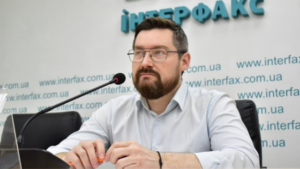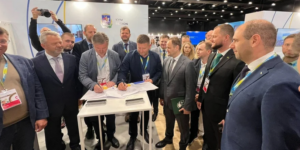
Imports of tractors to Ukraine in January-June 2025 amounted to $421.05 million, which is slightly less than in the same period in 2024 ($425 million), according to statistics from the State Customs Service.
According to the published statistics, tractors were mainly imported from the United States (18.9% of total imports of this equipment, or $79.7 million), China (17.5% or $73.8 million) and Germany (17.4% or $73.1 million), while a year ago it was Germany ($68.6 million), the Netherlands ($60.6 million) and China ($55.6 million).
In June of this year, imports of tractors increased by 21% compared to June 2024 to $63.6 million, which is also 3.6% more than the volume of imports in May of this year.
According to statistics, in January-June this year, tractors worth almost $3 million were exported, mainly to Romania (38%), Germany and Zambia.
As reported, imports of tractors to Ukraine in 2024 amounted to almost $784 million, which is 5.6% less than a year earlier, while exports amounted to $5.44 million against $5.74 million.

Brazil’s Ministry of Finance has raised its GDP growth forecast for 2025, but expects the economic upturn to slow down as a result of the country’s central bank’s tight monetary policy.
The GDP growth forecast for the current year has been raised to 2.5% from the 2.4% expected in May, and for 2026 it has been lowered to 2.4% from 2.5%.
The forecasts do not take into account the consequences of Washington’s introduction of 50% tariffs on all imports from Brazil, the Ministry of Finance notes. Earlier, US President Donald Trump announced that these tariffs would take effect on August 1.
“The tariffs are unlikely to have a significant impact on GDP growth in 2025, although certain industries may suffer quite severely,” the Ministry of Finance said in a statement.
In the first quarter of this year, Brazil’s GDP increased by 1.4% compared to the previous three months, the highest in three quarters. GDP growth in annual terms was 2.9%.
Earlier, the Experts Club information and analytical center made a video analysis of the prospects for the Ukrainian and global economies. For more details, see the video at https://youtu.be/kQsH3lUvMKo?si=F4IOLdLuVbYmEh5P

Bosnian investment group ASA Group has announced the completion of its acquisition of the Zito Backa flour mill in Kula, Serbia. This was stated in the company’s official press release published on Friday.
According to ASA Group, the deal makes its subsidiary ASA Trading a leader in Serbia’s grain sector in terms of grain trading volume, storage capacity, and processing capacity.
“This is a logical continuation of our expansion strategy in key sectors of the region. Zito Backa has more than a century of tradition, reliable quality, and infrastructure that matches our international ambitions,” said ASA Group CEO Eldin Hadzislimovic.
The company emphasized that it is building on its previous experience in asset integration, including the purchase of the Zitoprodukt mill in Bačka Palanka in 2018. According to ASA Group representatives, the new acquisition will complement the ecosystem in the consumer goods segment and strengthen the group’s export potential in Southeast Europe.
In addition to the grain sector, the holding company is actively developing projects in other industries, including date and vegetable oil production in Morocco and Turkey, as well as renewable energy in Bosnia and Herzegovina (solar power plants in Bosanski Petrovac).
Zito Backa is one of Serbia’s oldest flour milling companies. It was founded over 100 years ago. In 2013, the plant in Kula was modernized: capacity was increased to 220 tons of flour per day (in wheat equivalent) and a 50,000-ton grain storage facility was built. The company is known for its high-quality flour and stable supplies to domestic and export markets.
https://t.me/relocationrs/1170

Italian food packaging manufacturer GUALA PACK S.P.A is investing EUR12 million in the construction of a complex of industrial buildings with a total area of approximately 10,000 square meters in the Belaya Tserkov industrial park, according to Dmitry Kiselevsky, deputy chairman of the Verkhovna Rada Committee on Economic Development.
“The Bila Tserkva industrial park has just signed an agreement in Rome with Gualapack Ukraine, a subsidiary of the Italian company GUALA PACK S.P.A., for the construction of a complex of industrial buildings with a total area of about 10,000 square meters. The factory, which until recently operated in Sumy and was partially restarted on leased premises in the Ternopil region, will be relocated to the new premises,” he wrote on his Facebook page on Friday.
The plant manufactures packaging for the food industry. The company employs about 300 people with an average salary of 30,000 hryvnia.
According to Kysilevsky, the construction and connection of utilities will take about 12 months. All buildings will be built from scratch, taking into account the company’s infrastructure needs.
According to him, IP “Bila Tserkva” currently has 19 residents.
As reported, in April 2025, the Finnish company Peikko Group Corporation announced the commissioning of a plant for the production of concrete connections and composite structures at IP “Bila Tserkva.”
Other residents include Unilever, InTiCa Systems, Peikko, and Pripravka, which relocated from Kharkiv, as well as the Nova Poshta logistics depot, the Volytsia-Agro grain storage complex, the Plank Electrotechnic electrical fittings factory, and Virastar, a manufacturer of high-altitude equipment for construction work.
Belaya Tserkov and Belaya Tserkov 2 were included in the Register of Industrial Parks in 2018.
Gualapack Ukraine LLC has been operating in Ukraine since 2013 and is a leading manufacturer of flexible packaging for various types of production.
According to the company’s financial report on its website, in 2024, consolidated net profit decreased more than 10 times compared to the previous year, to UAH 13.05 million, with revenue growing by 3.6% to UAH 1 billion 145 million.
In May 2023, the company acquired 100% of Gualapack Poland (Poland) (until October 2023 – ALIKO-TRADING ЅроІка z ograniczoną odpowiedzialnością) with the aim of further expanding its trading activities in the Polish market.